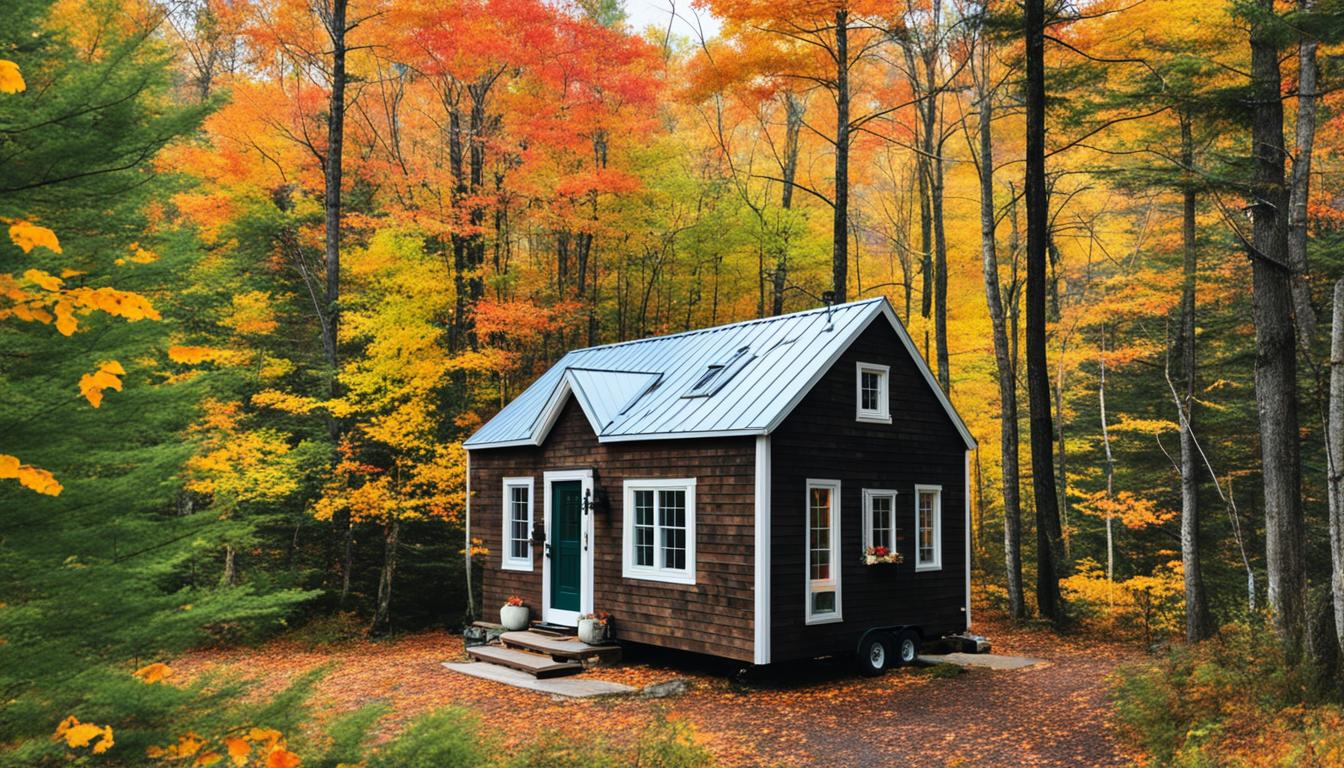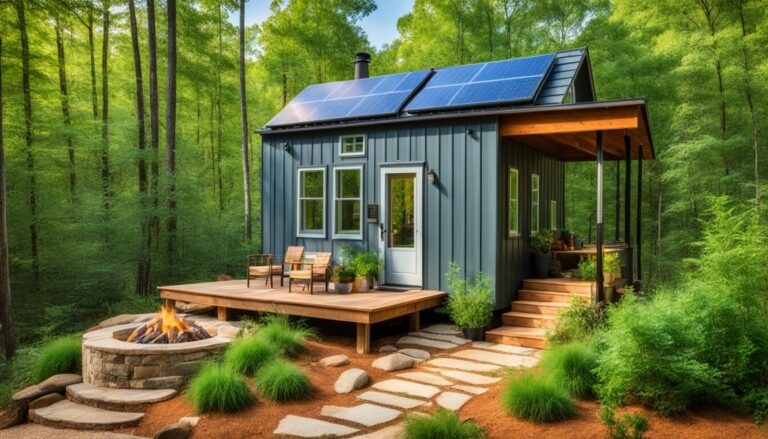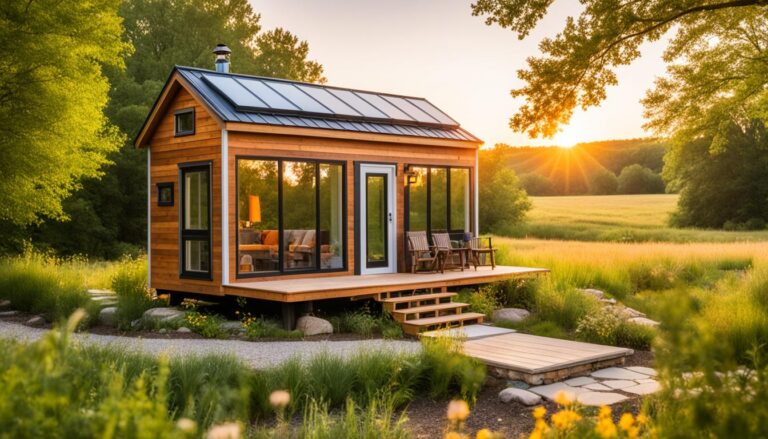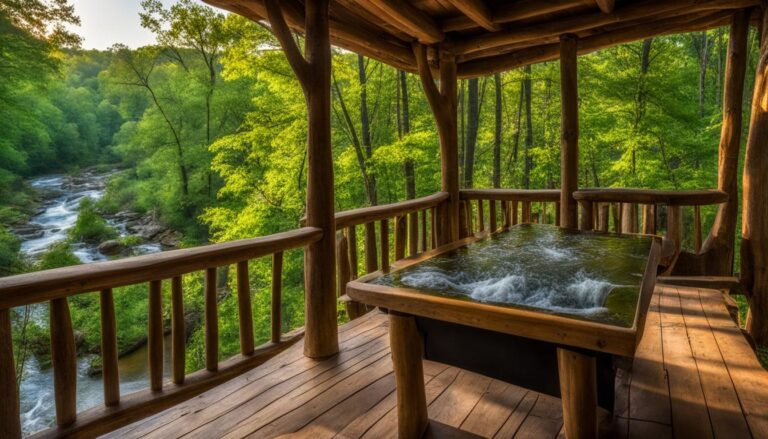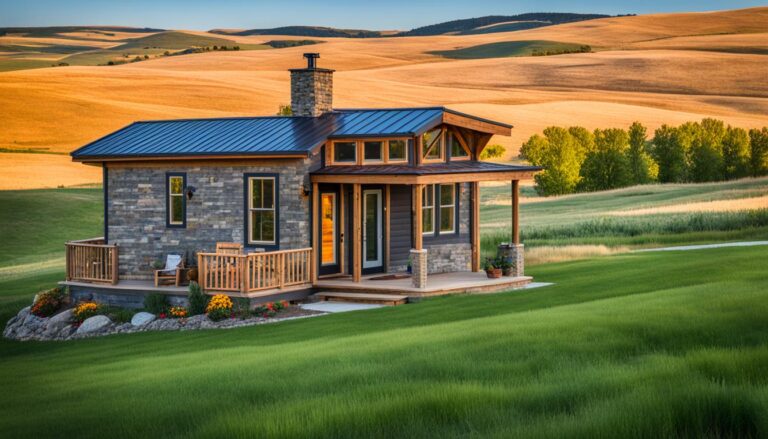Finding Tiny House Placements in Maine
Where can I put a tiny house in Maine? If you’re considering the tiny house lifestyle in the beautiful state of Maine, it’s essential to understand the regulations, zoning laws, and building codes that govern tiny house placement. Unlike many other areas, Maine has specific considerations and requirements when it comes to finding a location for your tiny home. Let’s explore the ins and outs of tiny house placement in Maine and discover the options available to you.
Key Takeaways:
- Maine has specific regulations and zoning laws for tiny house placement.
- Some municipalities in Maine have updated their ordinances to include a definition of a tiny home and specify where they are permitted.
- Compliance with building codes is necessary when placing a tiny home in Maine.
- Tiny house placement in Maine requires verification and approval from building officials, code enforcement officers, or planning boards.
- There are various property options, including purchasing land or joining tiny house communities, available for tiny house placement in Maine.
Tiny Home as Personal Property vs. Real Estate
In the state of Maine, the classification of a tiny home as personal property or real estate can have significant implications. When considering financing options and property tax obligations, it is essential to understand the distinction between these two classifications.
A tiny home in Maine is typically considered personal property, which means that the responsibility to comply with local codes and zoning regulations rests with the buyer. This classification allows for more flexibility and freedom in terms of placement and ownership.
However, it is important to note that if a tiny home is “affixed” to the land, meaning it is permanently attached or connected, it may be assessed as real estate and subject to property tax. This can occur when a tiny home is placed on a foundation or if it is considered a permanent structure.
Financing a tiny home with land as a single transaction may also lead to it being classified as real estate by a bank or lending institution. It is advisable to consult with financial advisors or lenders who have experience in financing tiny homes to understand the potential implications of this classification.
Property Tax for a Tiny Home in Maine
Property tax for a tiny home in Maine can vary depending on its classification as personal property or real estate. As mentioned earlier, a tiny home classified as personal property may have different tax obligations compared to one classified as real estate.
If a tiny home is considered personal property, it may be subject to personal property taxes, which are typically assessed at a lower rate compared to real estate taxes. The specific tax rates and regulations may vary by municipality, so it is essential to verify the local requirements.
On the other hand, if a tiny home is deemed real estate, it will be subject to the same property tax rates and regulations as traditional homes. This includes tax assessments based on the value of the property and potential increases over time.
It is crucial to consult with local tax authorities or assessors to determine the specific property tax obligations for a tiny home in Maine, considering its classification as personal property or real estate.
Understanding the classification of a tiny home as personal property or real estate is essential for both financial planning and compliance with local regulations. Whether you finance a tiny home with land or opt for separate purchases, being aware of the potential implications and requirements associated with each classification can help you make informed decisions and ensure a smooth tiny home living experience in Maine.
Knowing the Rules and Seeking Permission
When it comes to placing a tiny home, it is crucial to know and understand the rules and regulations in the area where you intend to set up your dwelling. However, the unfortunate reality is that local code enforcement officers often lack knowledge of tiny house regulations or may be resistant to the idea. This lack of awareness can pose a challenge for individuals seeking permission to place their tiny homes.
In some instances, due to the lack of knowledge or resistance from code enforcement officers, individuals may choose to place their tiny homes without explicit permission, commonly known as “under the radar.” This approach involves carefully selecting a location where the tiny home is not easily visible from the road or neighboring properties.
Before proceeding with this option, it is essential to weigh the potential consequences and risks. Placing a tiny home without permission can result in legal issues or fines if discovered by local authorities. Additionally, it is essential to be considerate of neighbors and the community, as unauthorized placement of a tiny home can create tension and conflicts.
Ultimately, the decision to place a tiny home without permission is a personal one that should be made after careful consideration of the local regulations, risks, and the individual’s comfort level. Some individuals may choose to be persistent in seeking permission, engaging in open dialogue with code enforcement officers to educate them about tiny house regulations and highlight the benefits of this housing option. Others may decide against placing a tiny home if the regulatory barriers are too significant.
Understanding the rules and seeking permission are essential aspects of the tiny house placement process. By being informed about the local regulations and engaging with code enforcement officers, individuals can navigate the challenges of placing a tiny home and increase the likelihood of finding a suitable location for their dwelling.
Interpretation of Existing Rules for Tiny Homes
In Maine, the regulations pertaining to tiny homes on wheels are not explicitly defined in most municipalities. As a result, building officials and code enforcement officers are often tasked with interpreting and applying existing rules to accommodate the unique characteristics of tiny homes. This process may involve assessing factors such as the minimum square footage requirements, zoning rules, and local ordinances.
In larger towns, where there may be stricter regulations in place, tiny home placement can be more challenging. These areas often have minimum square footage requirements that tiny homes may not meet, making it less likely for them to be permitted. Conversely, smaller towns tend to have fewer zoning rules and a lesser number of personnel dedicated to enforcing building codes. This can make it relatively easier to find suitable locations for tiny home placement in these areas.
It’s important to note that each town in Maine has the authority to establish its own set of rules and regulations for tiny homes. The final decision regarding the permit approval or denial lies with the building official, code enforcement officer, or planning board responsible for that specific jurisdiction.
Authority of Building Officials and Code Enforcement Officers
Building officials and code enforcement officers play an essential role in determining the feasibility of tiny home placement. They have the authority to interpret building codes, zoning regulations, and other pertinent guidelines when evaluating applications for tiny home placement permits.
“The interpretation of existing rules is crucial in ensuring that tiny homes meet the necessary criteria set forth by the state and local authorities,” says [Expert Name], a renowned tiny home consultant in Maine. “Building officials and code enforcement officers are responsible for reviewing the proposed plans, verifying compliance with regulations, and ensuring the safety and well-being of not only the occupants but also the surrounding community.”
Their expertise is essential in balancing the needs and desires of tiny home dwellers with the legal requirements and considerations concerning construction and land usage.
There are instances where building officials and code enforcement officers may encounter challenges in interpreting existing rules for tiny homes. Traditional stick-built, modular, or mobile homes have long-established processes for code enforcement, which may not directly apply to the unique characteristics of tiny homes. Despite these challenges, building officials and code enforcement officers have the authority to permit tiny homes, even if they are not entirely familiar with the specific requirements.
By working closely with professionals who specialize in tiny home construction, individuals seeking to place a tiny home can ensure that their applications adhere to existing rules and satisfy the requirements set forth by the respective building officials and code enforcement officers.

Image: Illustration showing the interpretation of existing rules for tiny homes
Code Enforcement Officers and Their Role
In the state of Maine, code enforcement officers play a vital role in enforcing state laws and local ordinances pertaining to various aspects of building standards. Their responsibilities include overseeing shoreland zoning, land use regulations, internal plumbing, subsurface wastewater disposal, and more.
Traditionally, code enforcement officers are well-versed in the regulations surrounding stick-built, modular, and mobile homes. However, when it comes to tiny homes, which are a relatively new concept, there is often uncertainty and hesitation due to the lack of standardized processes for code enforcement.
Despite these challenges, it’s important to note that code enforcement officers in Maine have the authority to permit tiny homes, even if they may not be familiar with the specific requirements. As the popularity of tiny homes continues to grow, it is expected that code enforcement officers will become more familiar with the unique considerations and regulations that apply to these dwellings.
“Code enforcement officers play a crucial role in ensuring that building standards are met and maintaining the safety and integrity of our communities. As the demand for tiny homes increases, it is essential for code enforcement officers to adapt and become more knowledgeable about the unique challenges and regulations related to these dwellings.” – [Code Enforcement Expert]
While there may be uncertainties and challenges surrounding the role of code enforcement officers with tiny homes, it’s important for both homeowners and code enforcement officials to collaborate and work towards finding effective solutions that ensure compliance with building codes while supporting the growing trend of sustainable and affordable housing options.
Summary:
Code enforcement officers in Maine are responsible for enforcing state laws and local ordinances related to various aspects of building standards. While traditional processes and regulations may be well-established for stick-built, modular, and mobile homes, code enforcement officers have the authority to permit tiny homes, even if they are not familiar with the specific requirements. Collaborative efforts between homeowners and code enforcement officials are vital in navigating the challenges and ensuring compliance with building codes for tiny homes.
Compliance with Building Codes for Tiny Homes
Ensuring compliance with building codes is crucial when it comes to constructing and placing tiny homes. There are several options available to establish compliance and obtain the necessary certifications and approvals.
Traditional Building Permit Process
The traditional building permit process involves working with the code enforcement officer who will inspect the construction of the tiny home. This inspection is necessary to verify compliance with building, plumbing, and electrical codes. By following this process, you can ensure that your tiny home meets all the necessary safety and quality standards.
Third-Party Inspections
“Hiring a certified Third-Party Inspector (TPI) can provide an additional layer of assurance for compliance with building codes,” says John Smith, a seasoned tiny home builder. “These inspectors specialize in tiny homes and can thoroughly assess the construction, ensuring that it meets all the required standards.”
A certified Third-Party Inspector inspects the tiny home during the construction process and provides a detailed inspection report. This inspection report can be submitted to any town in Maine for the issuance of a Certificate of Occupancy. The report serves as evidence of compliance with building codes, offering peace of mind to both homeowners and local authorities.
RV Certifications
Another option is obtaining RV certifications for your tiny home. National agencies offer RV certifications that verify compliance with safety standards for recreational vehicles. While these certifications may not cover all the building code requirements for permanent living, they can still be useful in certain instances. For example, if you plan to use your tiny home primarily for travel or temporary accommodation, an RV certification can be beneficial.
In conclusion, complying with building codes for tiny homes is essential to ensure safety and regulatory adherence. Whether you opt for the traditional building permit process, engage a certified Third-Party Inspector, or obtain RV certifications, each compliance option has its own benefits and considerations. By taking the necessary steps to achieve compliance, you can enjoy your tiny home with confidence, knowing that it meets the required standards.
The Impact of LD1981 in Maine
LD1981, a bill passed in Maine, has had a significant impact on the recognition and regulation of tiny homes in the state. This bill resulted in the inclusion of a specific definition of a tiny home in Title 29-A, providing clarity and legal recognition for this type of dwelling.
Prior to LD1981, many municipalities in Maine did not have specific rules or regulations in place for tiny homes on wheels. However, this bill changed the landscape by establishing the jurisdiction of the Secretary of State over tiny homes and allowing for the issuance of titles for these unique dwellings.
With a title from the Secretary of State’s Office, a tiny home in Maine is exempt from inspection by local code enforcement officers, except for zoning requirements. This means that individuals who own a titled tiny home have a streamlined process when it comes to compliance with building codes.
The introduction of LD1981 has helped clarify the legalities surrounding enforcement of building codes on tiny homes in Maine. It recognizes the unique characteristics of tiny homes and provides a framework for their titles, financing, and jurisdiction.
If you’re interested in learning more about LD1981 and the specific definition of a tiny home in Title 29-A, you can visit the official legislation page here.
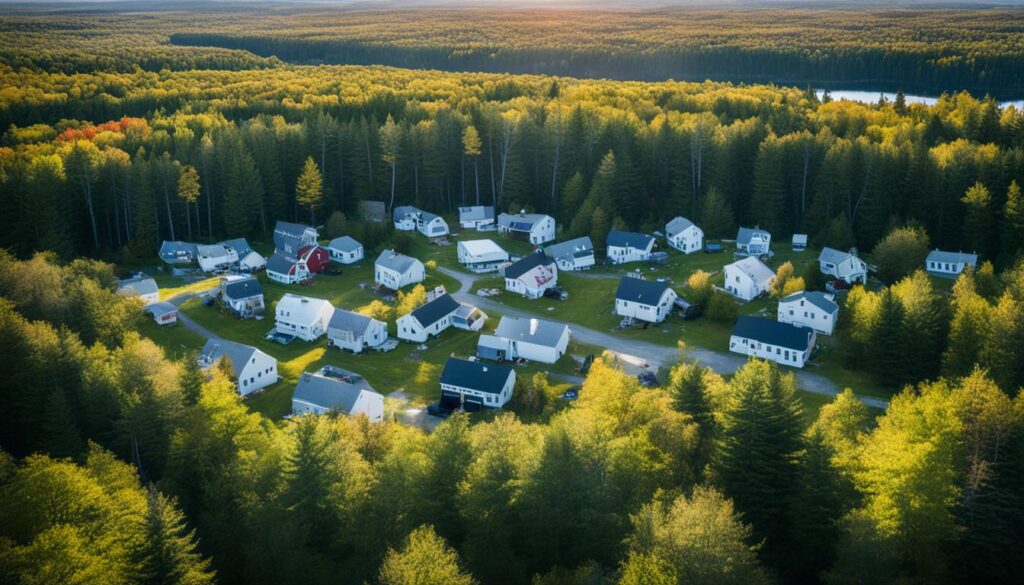
The image above illustrates the impact of LD1981 on the recognition and regulation of tiny homes in Maine. It serves as a visual representation of the legislation’s influence on the tiny house movement in the state.
Tiny House Builders and Trailers in Maine
Looking to turn your tiny house dreams into a reality? In Maine, there are several tiny house builders and trailer dealers who can help bring your vision to life. Whether you’re looking for a custom design, a pre-built model, or a trailer to transport your tiny home, these professionals have got you covered.
Tiny Homes of Maine is a reputable, family-owned business that offers a wide range of tiny home designs to choose from. With prices ranging from $30,000 to $120,000, they cater to various budgets and preferences. Whether you’re looking for a cozy cabin-style tiny home or a modern, minimalist design, Tiny Homes of Maine can help bring your unique vision to life.
If you’re open to exploring options outside of Maine, neighboring states like New Hampshire also have their own tiny house builders worth considering. Tiny House Northeast and Backcountry Tiny Homes are two popular choices known for their quality craftsmanship and attention to detail.
Once you have your tiny house design finalized, you’ll need a reliable trailer to transport it. Trailer dealers in Maine, such as Maine Trailer, Coldbrook Trailers & Equipment, and Dayton Trailer Sales, offer a range of trailer options suitable for tiny homes. They can help you find the right size and specifications to ensure a secure and hassle-free journey for your tiny home.
With the assistance of these reputable tiny house builders and trailer dealers, you can make your tiny house dreams a reality in Maine. Whether you choose to go with a fully custom design or a pre-built model, their expertise and experience will ensure that your tiny home is built to your exact specifications and meets all necessary requirements.
Tiny Houses for Sale and Rent in Maine
While the tiny house movement may not be as prevalent in Maine as in other states, there are still opportunities to purchase or rent a tiny house in the area. Maine offers natural beauty and outdoor activities, making it an attractive location for tiny living.
There are listings for tiny houses for sale in Maine, with prices typically ranging from $70,000 to $134,500. These homes come in various sizes, styles, and designs, providing options that cater to different preferences and budgets.
For those who want to experience the tiny living lifestyle without committing to purchasing a tiny home, there are options for tiny house rentals in Maine. Renting a tiny house allows individuals to immerse themselves in the tiny living experience and explore the benefits it offers, such as reduced environmental impact, simpler living, and the opportunity to live closer to nature.
Maine’s natural landscapes and attractions make it an ideal destination for a tiny house vacation. Renting a tiny house for a vacation allows you to enjoy the beauty and tranquility of Maine while also experiencing the unique lifestyle that tiny living offers. Whether it’s a weekend getaway or an extended vacation, staying in a tiny house provides a cozy and memorable experience surrounded by nature.
Reasons to Live in Maine
- Scenic beauty: Maine is home to breathtaking natural landscapes, including rugged coastlines, pristine lakes, and picturesque mountains.
- Outdoor activities: From hiking and camping to skiing and kayaking, Maine offers a wide range of outdoor activities for nature enthusiasts.
- Quality of life: With a low crime rate, good schools, and a strong sense of community, Maine offers a high quality of life.
- Relaxed pace: Maine’s laid-back and friendly atmosphere allows residents to enjoy a slower, more relaxed pace of life.
- Cultural attractions: Maine is rich in history, arts, and culture, with vibrant communities that offer art galleries, theaters, and music festivals.
Whether you’re looking to purchase a tiny house and make Maine your permanent home or rent a tiny house for a vacation, Maine provides a unique and rewarding experience. Explore the listings and rental options available in Maine to find the perfect tiny house that suits your needs and allows you to embrace the beauty and charm of this wonderful state.
Conclusion
Placing a tiny house in Maine requires careful consideration of local codes, zoning regulations, and the interpretation of existing rules. While there are no specific rules for tiny homes on wheels in most municipalities, some towns in Maine have updated their ordinances to include a definition of a tiny home and specify where they are permitted. It’s crucial for individuals to understand and comply with these regulations to ensure a smooth placement process.
Compliance with building codes can be established through various methods, including the traditional building permit process, third-party inspections, or RV certifications. Each option has its own benefits and considerations, and individuals should choose the approach that aligns best with their needs and goals. Collaborating with professionals in the tiny home industry can provide invaluable guidance and expertise throughout the placement process.
The passing of LD1981 has had a significant impact on the legalities surrounding tiny homes in Maine. This legislation provides a clear definition of a tiny home and establishes the Secretary of State’s jurisdiction over tiny homes. It has brought clarity and standardization to the enforcement of building codes, further supporting the placement of tiny homes in Maine.
For those interested in experiencing the tiny living lifestyle in Maine without the commitment of purchasing a tiny home, there are options for renting and vacationing in tiny houses. This allows individuals to enjoy the beauty of Maine and immerse themselves in the unique experience of living in a tiny home.
Whether you’re looking to place a tiny home in Maine or simply curious about this growing trend, understanding the regulations, compliance options, and available resources is essential. By navigating the process with knowledge and care, individuals can successfully make their tiny house dreams a reality in the picturesque state of Maine.

